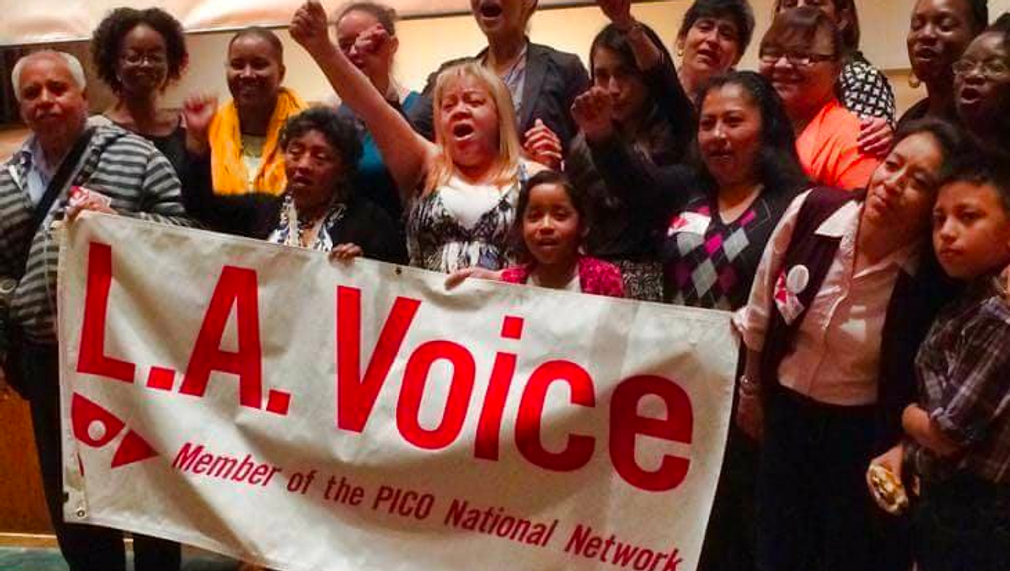Increasing Affordable Housing On Religious Land
LA Voice recruits faith communities and their leadership to create new affordable housing and ultimately provide a dignified home to every resident of Los Angeles County. Support for the Faith in Housing program will increase our capacity to develop affordable housing on congregational land, while simultaneously increasing economic sustainability for congregations. It will also support systemic efforts to eliminate zoning regulations at city, county, and state levels that pose significant barriers to housing development on church-owned land.

What is the primary issue area that your application will impact?
Housing and Homelessness
In which areas of Los Angeles will you be directly working?
County of Los Angeles
In what stage of innovation is this project, program, or initiative?
Expand existing project, program, or initiative
What is your understanding of the issue that you are seeking to address?
Housing affordability in Los Angeles County had reached a critical point even before the massive financial impacts of the COVID-19 pandemic. An estimated 88% of county households across all income brackets are “cost-burdened,” or spending 30-50% of income on rent or mortgage payments. Those facing housing instability, eviction, and homelessness are heavily concentrated in Black and Latino communities. The shortage of housing also stems from the lack of houses being built in recent decades, and state and regional policies now require local governments to plan for 341,000 homes that are affordable to low and very low-income people by 2030. Meanwhile, congregations across the County are sitting on land that has been underutilized as membership continues to decline. LA Voice is using this opportunity to meet some of the challenges of affordable housing production and supply and provide a source of income for congregations so that they can continue to serve the community.
Describe the project, program, or initiative this grant will support to address the issue.
LA Voice’s Faith in Housing program helps congregations to develop affordable and permanent supportive housing by identifying sites, guiding the application and permitting process, providing a selection of model designs, and offering a network of support for financing and construction. However, because the process for review and discernment can take an extensive amount of time—requiring additional layers of approval if tied to denominational oversight—we expedite the identification of viable congregations to more efficiently guide them. We will hold 2 educational cohorts of 10 congregations, for a total of 20 congregations each year. Each cohort agrees to delegate at least 2 representatives to participate in a 4-session, interactive curriculum. This model will allow congregations to receive information and network with one another while addressing concerns and enables LA Voice to prioritize sites with more favorable zoning and congregational will. Further, to address restrictive zoning laws that limit affordable housing development on commercial, public, and church-owned lands, LA Voice works with jurisdictions on the creation of overlay zones that eliminate the need for site-by-site changes. This powerful advocacy allows faith communities to fulfill their expressed desires to house those in need and moves us closer to our goal of establishing an overlay zone for all of California, making all church sites eligible to build affordable housing by right on their land.
Describe how Los Angeles County will be different if your work is successful.
We address the root causes of the affordable housing shortage in the county and statewide—a confluence of systemic racism, lack of sufficient production, poor policy choices, and the use of real estate as a commodity vs. a “human right” or basic need, among others. Through our network of faith-based organizations and partners, LA Voice is leading a growing movement. By facilitating this work with congregations, addressing zoning barriers to development on congregational land, and conducting grassroots organizing that engages community members in advocating to their government, we can create the communities we want. Another strategy is combating NIMBY attitudes (ie, "Not In My Backyard,” or opposition to neighborhood change) through education and testimonials from people who are impacted. Lastly, by facilitating the adoption of an overlay zone, we can move Los Angeles County to remove barriers for thousands of faith-based organizations to build affordable housing on their property.
What evidence do you have that this project, program, or initiative is or will be successful, and how will you define and measure success?
In the next year, we aim to add 250 affordable housing units to our pipeline. This builds on our past success; for example, in August 2020 a Culver City church signed an option to ground lease for a project that will result in 95 units of low income and permanent supportive housing. LA Voice is supporting the church through pre-development. In February 2021, a second option to ground lease was executed for a 60 unit adaptive reuse development in Inglewood, a city undergoing rapid gentrification. LA Voice also helped a downtown congregation execute an exclusive negotiating agreement for a 686-unit market rate high rise with 137 units of affordable housing in April 2021. By serving as intermediaries and advisors, LA Voice creates effective partnerships between congregations and developers. As a result of our zoning advocacy, Sierra Madre became the first city in the state to include a Religious Overlay in their adopted Housing Element draft for the Regional Housing Needs Assessment.
Approximately how many people will be impacted by this project, program, or initiative?
Direct Impact: 300
Indirect Impact: 1,000